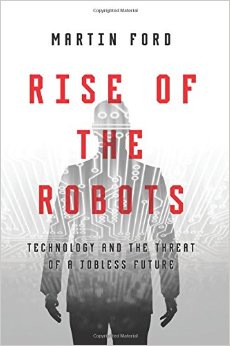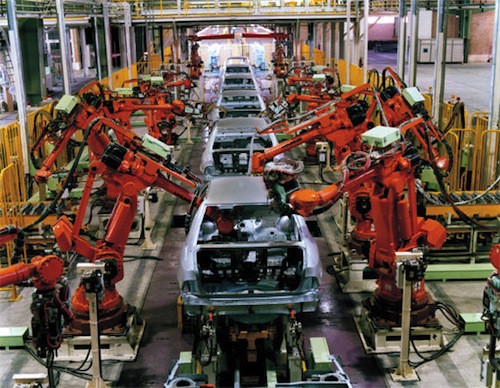


06/21/2015

C-SPAN’s BookTV showed an author talk this weekend with Martin Ford who wrote the important Rise of the Robots. You can watch the hour-long discussion in Seattle on the C-SPAN site or listen to the audio here.
Ford opened his talk by disagreeing with the title given by the Seattle Town Hall: How to Stop Robots From Stealing Jobs:
FORD: I should say right off the bat that I noticed in the program that the title for tonight’s presentation is “How to Stop Robots From Stealing Jobs” and I have to tell you honestly that I don’t have an answer for that. I believe that it is probably inevitable that technology is going to displace more and more workers in the economy and the challenge for us is really to figure out a way to adapt to that and ensure that we still have continued broad-based prosperity in the future even as that unfolds.Ford has life experience that makes him an excellent explainer of the effect of robots and automation on the workplace because he saw job obsolescence happen in his own small business. He had a Silicon Valley company back when software was loaded on disks and sent to customers through the mail. Those shipping jobs disappeared when software began to be transmitted via the internet: no mass layoffs that make the news, just gradually disappearing employment that leaves us where we are today in the jobless recovery.
A 2013 Oxford University study (The Future of Employment) estimated that 47 percent of American jobs could be taken by automation within 20 years. The Gartner tech consulting firm has forecast that one-third of jobs will be performed by smart machines in 2025, just 10 years from now.
A third of the jobs are falling off a cliff in 10 years?? That’s huge! Why isn’t this topic being debated in public, beyond just the tech community?
One aspect: because of the new workplace technologies, America certainly doesn’t need increased millions of legal immigrants to fill a mythical labor shortage touted by amnesty advocates. Most additional immigrant “workers” will end up in the angry unemployed underclass, which is already large.

Ford’s sense about how the economy and markets work comes through in this recent newspaper interview:
Q&A: Martin Ford, on the robots coming for your job, By Matt O’Brien, San Jose Mercury News, June 12, 2015SUNNYVALE — If you are reading this from the cubicle of your white-collar workplace, Martin Ford is pretty sure that a robot is coming to take your job.
But the Sunnyvale software entrepreneur and author of the recently released “Rise of the Robots: Technology and the Threat of a Jobless Future,” published by Basic Books, also sees hope for society if it can adapt its political system to technology that will automate most routine tasks.
He worries most about his 7-year-old daughter and her peers who grow up in a world where businesses employ robots to occupy today’s best careers. He wants the 2016 presidential candidates to address this threat, but doubts they will. This interview has been edited for length and clarity.
Q: You grimly recount all the white-collar jobs that will be lost to automation, from lawyers to radiologists and journalists. Are there sectors that will be immune?
A: I think health care will probably be the sector that is slowest to see these changes. Radiologists and pathologists (could become obsolete), but if you look at people like nurses and doctors, people who need to move around and interact with patients, building a robot to do that stuff is still science fiction. If I were giving someone advice of what to study, health care is a pretty good bet. But we can’t have a whole economy that’s just health care. There aren’t enough jobs to absorb everyone.
Q: What made you return to this topic after writing about it in 2009 (in the self-published “Lights in the Tunnel”)?
A: The issue back then was just so off the radar. People thought it was kind of crazy (and I couldn’t find a publisher). I wanted to extend the argument I made then, and hopefully get it in front of more people.
Q: Has your own perspective changed since then?
A: The technology has moved even faster than I thought. I talked about an autonomous car back then, and it happened within a year. Same with IBM’s Watson (the computer that won the quiz show “Jeopardy” in 2011). That was pretty remarkable. But in general I haven’t changed my view that in the long term this is going to be a disruptive change and we’re going to have to do something fairly radical to adapt to it. It might be 10, 20 years, but eventually we’ll get to the point where there won’t be enough jobs for most people — average people who aren’t rocket scientists with a Ph.D. from MIT.
Q: One of the scariest ideas you talk about is techno-feudalism. How worried are you that’s a real possibility?
A: If we have inequality on steroids, we essentially divide into two societies with a tiny minority that’s extraordinarily wealthy and everyone else is (jobless and) just kind of falling apart. The wealthy would rope themselves off, live behind gates. The vast majority of people would be really miserable. But it’s not clear that’s even a viable path. In order to have a successful economy, even the people at the top have got to sell something. They need consumers for that. If we really got into a situation where most people just don’t have the income, that could create a deflationary spiral, financial crisis, dragging the wealthy into it as well.
Q: The crux of your concern is not so much about losing jobs as losing consumers.
A: It’s a big issue. There’s some evidence inequality is already undermining the economy to some extent. Businesses like Wal-Mart are struggling because their customers can’t afford to buy things. You need customers to drive demand. And you’re not going to have sustained innovation without a market to inspire entrepreneurs. Imagine if you put Steve Jobs on an island. He’s going to be gathering up coconuts like everyone else. His talents aren’t worth anything in that environment. Our system we’ve built is a mass-market economy that depends on a huge number of people who can buy stuff.
Q: How did you come to your solution of a guaranteed basic income for everyone?
A: It’s not my idea. (Austrian economist and libertarian hero) Friedrich Hayek, back in the 1930s, was already advocating it. People have been advocating it for different reasons, some with a sense of social justice and many conservatives who see it as an alternative to a big government safety net. It’s much more of a free market idea; you simply give people money and they go out into the market. As we move into this new reality, with all this new technology, we may get to the point where we seriously have to consider it in order to keep things going. It’s essentially a way to adapt capitalism to the future.
Q: What areas of work surprised you by how quickly they’re becoming automated?
A: The whole area of deep learning has been remarkable. You have machines that can outperform people in recognizing images. Skype can now translate from Chinese to English in real time. What they’re doing in terms of pattern recognition and processing is pretty incredible. That’s also one of the areas where humans really excel. A lot of lower-wage online jobs out there involve things computers can’t do yet, but deep learning is getting better and better. I don’t think we have to worry anytime soon about computers waking up and becoming conscious, but in terms of specialized applications, they’re getting pretty remarkable.
Q: A lot of people would characterize your book as pessimistic. Do you see it that way?
A: I view it as a little pessimistic in the short run, just because of the political challenge we face in adapting to automation, but in the long run very optimistic if we can make the transition. Techno-optimists say the biggest problem we face in the future is no one’s going to have to work, so what will we do to occupy our time or have a sense of worth or fulfillment? That may be an issue, but certainly long before that, distribution is going to be an issue. The techno-optimists kind of brush that aside. I think of it in terms of Maslow’s pyramid (of human needs). At the base of pyramid you have basic needs, and at the top of the pyramid you have a sense of fulfillment. But you need the base first, a place to live and food to eat.
Q: Do you have any hope the political system will address this before it actually happens?
A: It’s unlikely we’ll have a radical shift until there’s a real crisis.
Martin Ford
Occupation: Author, “Rise of the Robots: Technology and the Threat of a Jobless Future”; founder and CEO of Solution-Soft
Residence: Sunnyvale
Education: Bachelor’s degree in engineering, University of Michigan; MBA from UCLA Anderson School of Management
Age: 52
Birthplace: Reading, England
Five things about Martin Ford
1. He was inspired to become a computer engineer by Tracy Kidder’s 1981 book “The Soul of a New Machine.”
2. Worked in the 1980s for Massachusetts-based microcomputer company Data General, the same firm featured in Kidder’s book.
3. Founded the Silicon Valley software development company Solution-Soft, where he first noticed how automation, outsourcing and cloud computing were making some of his workforce obsolete.
4. Born in England, he grew up in a military family living in North Dakota and Michigan.
5. His interest in automation doesn’t apply to his personal life; he drives a stick shift and doesn’t have any robots at home.